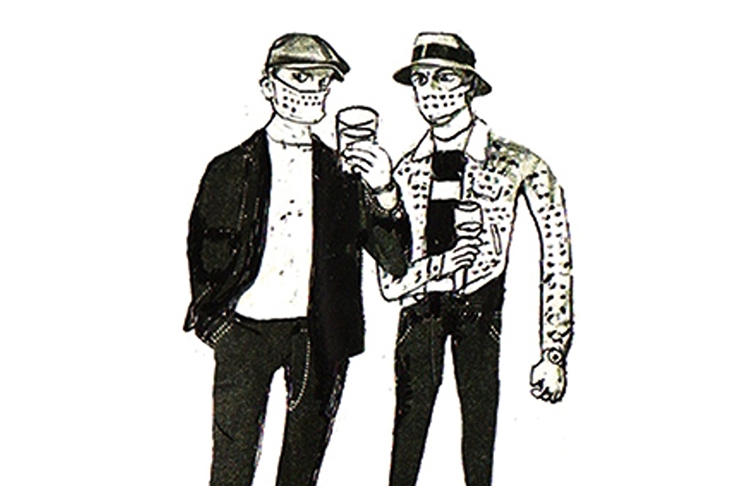Most of my women friends work hard to keep ancient friendships alive; the seasonal lunches, shopping trips and afternoon teas are observed as scrupulously as the feasts of the liturgical calendar. ‘Friends make all the difference in life,’ my mother used to say. In her late eighties, she would defy the wobbles of Parkinson’s and haul herself on to a bus for the all-important ‘Tea with Daisy’, inscribed with a shaky hand in her diary. My sister was the same. In September last year she marched her girlfriends off to Whitby for a week of what I assume was slightly manufactured jollity (she was dying of cancer), but you’d never tell from looking at the photographs.
I’ve never thought male friendships were so robust and now, after lockdown, I’m certain of it. But it didn’t seem that way when we were young. Alcohol was our bonding agent at university and that wasn’t hard to sustain when my mates slid into jobs in merchant banking, and I landed in Fleet Street with an American Psycho expense account. Gradually we built new friendship networks and assumed, with the naivety of young people, that we could just slot them into our old ones. Then there was a spate of disastrous ‘trial marriages’ – Home Counties gold-digger hooks up with posh boy, only to discover he’s penniless, that sort of thing – and fractures started appearing. We took sides. The happy marriages didn’t help, either: wives with young children banned overnight stays by 35-year-old freeloaders who didn’t realise the rules had changed since we were 19.
And so we settled into a pattern familiar to middle-aged men everywhere. We relied on bumping into each other at parties – only by this time there was an equal danger of bumping into someone you disliked, or one of those annoying oddballs who show up like clockwork in A Dance to the Music of Time. (Lots of people put me in that category, I should add.) Sometimes the old gang would arrange to link up in the pub, though organising it was vastly more strenuous than we remembered. But it was comforting – and interesting to see who sported the first bald patch or had to fumble for reading glasses to consult the menu. Before long, talk of children’s schools had switched to universities and previously hardened boozers pronounced the once unthinkable words: ‘No, I won’t, thanks.’ It was still fun, though.
Then, out of the blue, lockdown and the snapping of the threads of friendship. ‘He never leaves Wiltshire these days.’ ‘I leave messages, but no reply.’ ‘I think he must have a new mobile number.’ I’ve heard versions of these complaints so often in the past year that I’m sure it must be happening all over the country. The only large-scale research on this topic comes from Australia, where academics at the universities of Wollongong and Sydney found evidence of shrinking friendship networks after lockdown. Men were vulnerable because they had fewer intimate friends than women and suffered from a ‘masculine aversion to initiating contact’.
And, we might add, a masculine aversion to talking about dead friendships. In past centuries, men would declare their affection for each other in fawning phrases accompanied by hugs and hand-holding. Mostly there was no sexual attraction: friendship itself was a single-sex phenomenon and it wasn’t until the Oscar Wilde trial that such behaviour was considered unmanly. The new reticence swept away a whole vocabulary for celebrating the bonds between men – and for mourning their loss.
As a result, it’s easy to miss the signs that an emotionally taciturn man is overwhelmed by the pain of falling out with his best mate or watching their relationship wither away. And I’m not just talking about my generation. A few years ago, I worked with a group of young journalists doing roughly the same job, on the same publication, as I had 25 years earlier. The hours were cruel, the money terrible. Relationships snapped all the time but these guys were too embarrassed to talk about it. They knew it was happening, though: endless sackings and resignations meant their friend cupboard was constantly being cleared out for them.
Clearing out the friend cupboard. Now there’s a phrase you hear all the time these days, especially from people in late middle age. During the pandemic it was suggested that the lockdowns were an excuse to carry out this brutal task; those friends of mine moaning about pals not returning calls etc seem to think they’ve been singled out for cleansing. But I suspect the truth is more complicated, though just as depressing.
When we were young, in an era before texting and Instagram, nearly all friendships were face to face: the phone was reserved for drunks, parents and old people. We kept our friend cupboards overstocked, if only to ward off boredom. Then we passed from what Philip Larkin called ‘the fillet steak of life’, the years 20 to 40, and on to the ‘short cuts’ beyond. The friend cupboards were emptied and refilled haphazardly. Social media brought about some reunions but blew other friendships apart at the click of a mouse, especially during Brexit. Socially ambitious couples who moved out of Fulham to renovate a manor house discovered the grim truth spelled out in Julian Fellowes’s Snobs: that you can buy your way into a smart London set but not into the squirearchy. Stuck in Wiltshire? Maybe – but often stuck there alone, lockdown or no lockdown, having committed the mortal sin of boasting about the size of their property over lunch with county grandees.
So why not link up with old friends in London? Different reasons, but for some older people the lockdown unleashed a particular breed of black dog. One of the respondents in the Australian survey puts it neatly: ‘Covid has given me licence to withdraw into myself more. Now things are opening up I don’t want to come back out.’
Precisely. That’s exactly how I feel. Why did no one warn me that staring at empty walls was so addictive? But then I think of ‘Tea with Daisy’ (who is still flourishing at 100, last I heard) and the girls’ heroic merrymaking in Whitby, and I realise that it’s time to pull myself together.
Got something to add? Join the discussion and comment below.
Get 10 issues for just $10
Subscribe to The Spectator Australia today for the next 10 magazine issues, plus full online access, for just $10.
You might disagree with half of it, but you’ll enjoy reading all of it. Try your first month for free, then just $2 a week for the remainder of your first year.














Comments
Don't miss out
Join the conversation with other Spectator Australia readers. Subscribe to leave a comment.
SUBSCRIBEAlready a subscriber? Log in